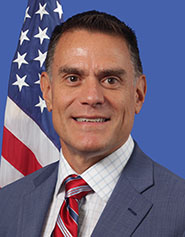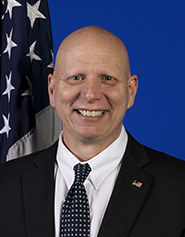ato
Alaska Flight Service Master Flight Plan Worksheet
Alaska Flight Service Master Flight Plan Worksheet.
Utilized by aviation stakeholders to file information used in ATC search and rescue.
David Wil Riggins
 Mr. David “Wil” Riggins is the Federal Aviation Administration's (FAA) Vice President of Flight Program Operations, AJF-0, for the Air Traffic Organization. In this role, Mr. Riggins serves as the agency's Flight Program Executive. He is responsible for all aspects of FAA Flight Program safety, administration, operations, training, and maintenance.
Mr. David “Wil” Riggins is the Federal Aviation Administration's (FAA) Vice President of Flight Program Operations, AJF-0, for the Air Traffic Organization. In this role, Mr. Riggins serves as the agency's Flight Program Executive. He is responsible for all aspects of FAA Flight Program safety, administration, operations, training, and maintenance.
The core business of Flight Program Operations is safe flight operations and the efficient execution of its four primary missions: aviation safety training; flight inspection; research, development, test and evaluation support; and critical event response/transportation. Mr. Riggins oversees all operations in support of the National Airspace System and United States Military. The FAA Flight Program operates 39 aircraft in worldwide flight operations. The organization holds an Air Operator certificate under Part 135, as well as a Part 145 repair station certificate.
Mr. Riggins has been with the FAA since 2014, when he joined as an Aviation Safety Inspector and Principle Operations Inspector in Flight Standards at the Washington-Dulles Flight Standards District Offices. In 2016, Wil joined Flight Program Operations (AJF) where he initially served as a pilot, then as the manager and Chief Pilot of the Washington Flight Program at Washington Reagan National Airport (DCA), prior to serving as AJF’s Deputy Vice President.
Before his career with the FAA, Mr. Riggins spent more than 27 years as a U.S. Army officer. After his 1987 graduation from the U.S. Military Academy at West Point, NY, Mr. Riggins was assigned to Fort Bragg, NC as an 82nd Airborne Division paratrooper. He served in Operation Just Cause in Panama and in Saudi Arabia and Iraq supporting Operation Desert Storm. At the rank of Captain, Mr. Riggins served as an Army Ranger before he began flying with Army Special Operations units. Following this assignment, the Army selected him to attend graduate school at the University of Virginia, where he earned a Master’s Degree in systems engineering.
Next, Mr. Riggins served as a special operations liaison in Seoul, South Korea. After a one-year program at the Army Command and General Staff College at Ft. Leavenworth, KS, Mr. Riggins was assigned to the Tampa, Florida-based U.S. Special Operations Command. Following 9/11/2001, he served a total of three deployments to Afghanistan. A graduate of the Army War College, Mr. Riggins’ final post was at the rank of Colonel in the Pentagon as chief of investment for the Army Budget Office, responsible for a $30 billion portfolio.
Mr. Riggins has logged over 6,000 flight hours. He holds an Airline Transport Pilot certificate with CE-560XL and CE-680 type ratings, and commercial privileges for rotorcraft-helicopter, instrument helicopter. Additionally, he is a Certified Flight Instructor ASEL, AMEL, and Instrument.
Franklin J. McIntosh
Wednesday, July 30, 2025
Mr. Franklin McIntosh assumed the role of acting Chief Operating Officer on May 23, 2025. In this role, he provides executive leadership and direction to the seven service units within the Air Traffic Organization (ATO).
Previously, Mr. McIntosh served as the Deputy Chief Operating Officer where he oversaw the direction of the four operational service units within the Air Traffic Organization (ATO): Air Traffic, Flight Operations, System Operations, and Technical Operations.
Prior to becoming the DCOO he served as Vice President, Safety and Technical Training. In this role, he set the vision and executive direction for a multi-layered organization of approximately 567 team members, responsible for safety, quality assurance, policy and performance, and mission support for technical training for the Air Traffic Organization (ATO).
Mr. McIntosh also served as the Director, Air Traffic Operations, Central Service Area (CSA). He served as the key agency representative on the management of air traffic control operations and services for the CSA. He oversaw a highly technical workforce in excess of 6,000 employees in a complex, multi-disciplined organization responsible for the safe, efficient, and structured movement of aircraft while exercising direct line authority for 128 FAA Facilities and over 90 Federal Contract Towers.
Mr. Mcintosh has a 22-year career with FAA. He began his Federal civilian career as an Air Traffic Control Specialist in 2000. In 2013, he entered the manager ranks and served in multiple roles to include Operations Manager, Manager of CDM and International Operations, Air Traffic Manager and General Manager. As General Manager between 2018-2019, Mr. McIntosh served as the single point of contact between district facilities, senior ATO management and the customer community. He was responsible for interagency coordination to ensure successful integration and modernization of the National Airspace System.
He holds a Bachelor of Arts in Public Administration from the University of Texas at San Antonio. He is also a graduate of the Federal Executive Institute.
